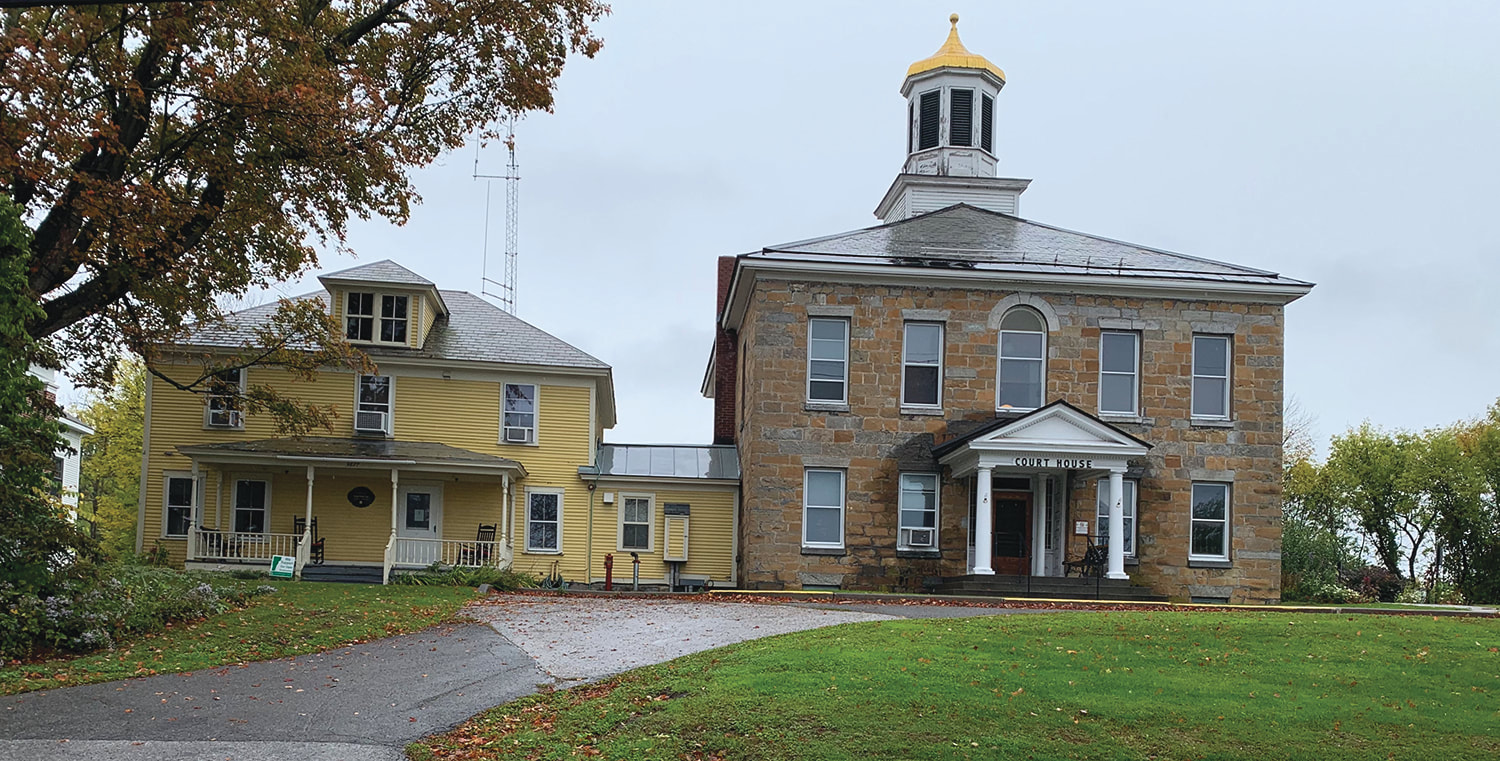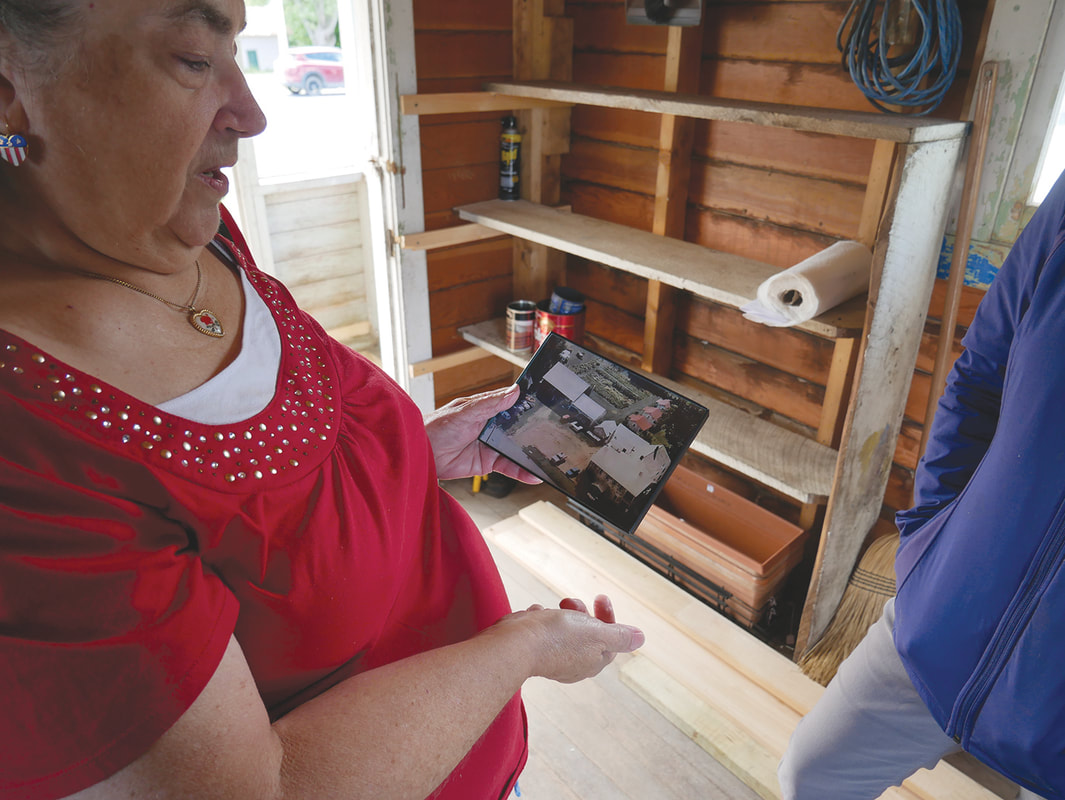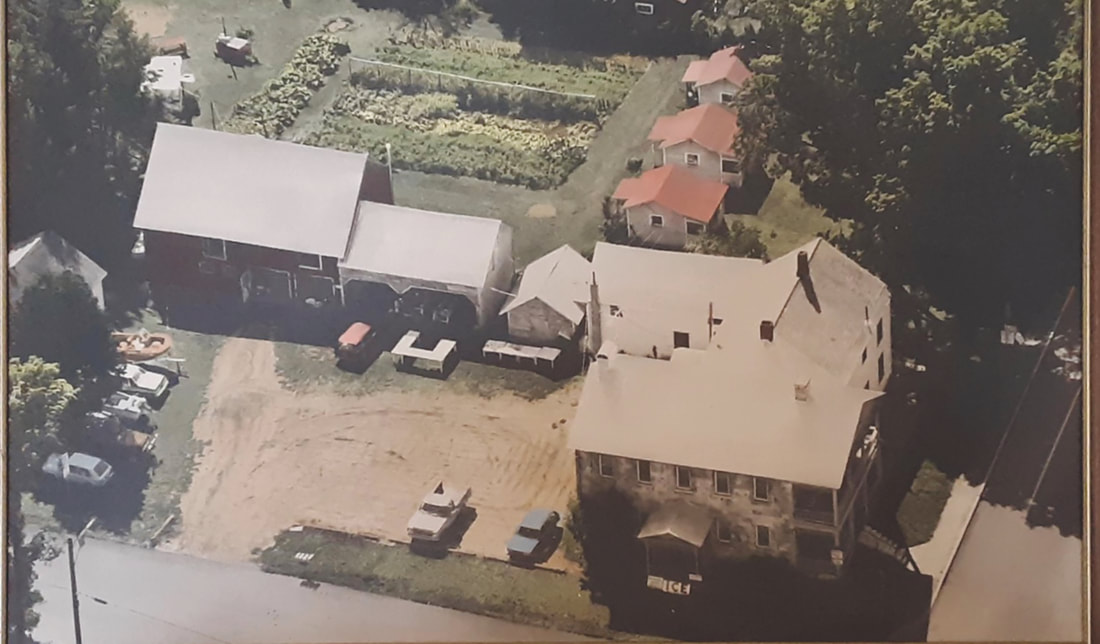 The Grand Isle courthouse, located in the village of North Hero is scheduled to reopen for five day a week service in March. Islander file photo. The Grand Isle courthouse, located in the village of North Hero is scheduled to reopen for five day a week service in March. Islander file photo. By MIKE DONOGHUE Islander Staff Writer NORTH HERO -- The Grand Isle County Courthouse in North Hero should be open again five days a week by March 1, according to Scott Griffith, the Interim State Court Administrator. Griffith on Thursday, in response to the latest series email from Grand Isle State's Attorney Doug DiSabito, wrote that an employee from Securitas, the Judiciary’s private security vendor, will be available to help fill the needs for screening at the courthouse. Chittenden County Sheriff Kevin McLaughlin also has made a commitment to help, Griffith wrote. DiSabito said resuming fulltime operations is great news for Grand Isle County residents that want to have their judicial services delivered in their home county. DiSabito has been helping lead the charge since former Court Administrator Patricia Gabel ordered the historic county courthouse closed on Mondays, Wednesdays and Fridays last August due to staffing shortages for security. DiSabito, along with the three state senators and two state legislators that serve Grand Isle County, have been among the officials pushing for fulltime service to resume. The state eventually resumed four-day service last fall, but DiSabito kept pushing for restoration of full service. He maintained Grand Isle County should never be treated any less than all the other counties in Vermont. "Persistence pays off," DiSabito told The Islander when reached by phone on Thursday. Griffith said many people have been involved in the talks and he cited John Campbell, executive director for the Vermont State's Attorneys and Sheriffs and his staff in Montpelier. State Sen. Dick Mazza, D-Grand Isle/Colchester and Sen. Corey Parent, R-Franklin/Alburgh, who serve on the Senate Institutions Committee, said Thursday they are continuing to work on securing funds to ensure improvements required due to COVID restrictions can be implemented at several courthouses, including in North Hero. Mazza said the legislators and judiciary have been working on trying to restore full court services throughout Vermont, but he was especially concerned about Grand Isle County. Parent, as part of an email chain, told Griffith that there will be a push to ensure proper funding for the Judiciary in the Capital budget for the upgrades in North Hero. State Senate Minority Leader Randy Brock, R-Franklin/Alburgh upon learning about the increased service, sent a return email to Griffith thanking him. "This is very good news and your continued work to re-open fully the Grand Isle Courthouse is very much appreciated," Brock wrote. Grand Isle Sheriff Ray Allen had notified the state last April that his deputy assigned to courthouse security would be retiring during the summer and the department would not have anybody to replace him. Allen said the state judiciary would have to take back the security contract at the courthouse. The state did not take enough constructive steps to fill the void by the time the deputy retired. Gabel ordered services reduced to two days a week. The Selectboards in at least three towns in the county became upset by the loss of services and Chairman Jeff Parizo in Grand Isle began to organize a county-wide meeting. He later punted the organizing to DiSabito and his staff. Three key figures from the Court Administrators Office came to Grand Isle in September for the county-wide meeting with state legislators, town officials and taxpayers concerned that they could not get legal services in the county. Among those attending was one judge and one retired judge, who were not impressed by the reduced service for Family, Civil, Criminal and Probate divisions. By October, Griffith said a temporary plan was developed for security services for 4 days a week. That has continued on, but DiSabito and others kept asking when full service would resume. It now looks like it is just less than two weeks away.
0 Comments
 Doug DiSabito, Grand Isle State's Attorney. Doug DiSabito, Grand Isle State's Attorney. By ISLANDER STAFF NORTH HERO -- Grand Isle County State’s Attorney Doug DiSabito said Tuesday that the triple shooting leaving two dead and one seriously wounded in Alburgh was pointless. “This was a senseless shooting of two people after a brief, petty dispute over hunting rights on a certain parcel of land,” DiSabito told The Islander. The shooting is the first reported homicide case in Grand Isle County since DiSabito was sworn in as its chief prosecutor in February 2015. DiSabito responded to the scene shortly after the shooting late Saturday night and has continued to work with state police. He said he is shocked that people are turning more to firearms to settle disputes. “Shortly after this tragic event occurred, there was a reported road rage incident in Chittenden County where shots were allegedly fired. And then there was the murder suicide in Lamoille County after that. All senseless and heartbreaking. People must keep their tempers in check, and not resort to such devastating violence,” he said. “Where is all this hatred originating from in our society? It has no place in our communities,” DiSabito said in his email. “On a related note, I am incredibly disappointed by the various posts and comments on social media—people are spewing hatred at each other, providing misinformation, disparaging law enforcement, criticizing press releases, and so on. It is so incredibly divisive and serves absolutely no legitimate purpose. It just perpetuates more hatred and division, at a time when we should be providing kind words and consolation to the families and friends affected by this tragedy,” he said. DiSabito reported his office is continuing to work with Vermont State Police, its Bureau of Criminal Investigations and Vermont’s Chief Medical Examiner “with the goal of completing this investigation and finding out every fact that led up to the death of two Islanders.” He wrapped up his comments: “I extend both my sincere appreciation for all the first responders and law enforcement officers who responded to the scene, and my heartfelt condolences to all the families and friends of the deceased.”  Two lives were lost and another man in critical condition after a shooting on Cameron Drive in Alburgh late Saturday night. Photo by ROB SWANSON, Islander Photojournalist. Two lives were lost and another man in critical condition after a shooting on Cameron Drive in Alburgh late Saturday night. Photo by ROB SWANSON, Islander Photojournalist. By MIKE DONOGHUE Islander Staff Writer ALBURGH -- The deaths of two Alburgh men following a wild shootout outside a home on Cameron Drive have both been ruled homicides by Vermont's Chief Medical Examiner and Vermont State Police. David Mohamed, 51, died from multiple gunshot wounds to the torso, while Larry P. Cameron, 41, died from a single gunshot wound to the torso, according to the autopsies conducted on Monday. Cameron’s cousin, Devin Cameron, 27, of Alburgh remains in critical condition at the University of Vermont Medical Center after being struck by multiple gunshots, including critical injuries to his arm. The triple shooting happened outside Larry Cameron’s residence and was the culmination of feud that had simmered for about a week on who had the right to hunt on land in North Hero owned by an out-of-stater. It reached a boiling point on Saturday evening and ended with shots flying shortly before 10 p.m. on the private single-lane dead end road. Friends of the three men had told The Islander that there had been some public feuding and threats on social media leading up to the shooting. State police also confirmed that shortly before the shooting a fistfight between Devin Cameron and David Mohamed had happened at Dillenback Bay fishing access in Alburgh. Mohamed got the losing end of that fight and the two Camerons left the access, according to police. Police said Mohamed then drove to Larry Cameron's home in an apparent search to continue the dispute. He was accompanied by two friends -- a 23-year-old man and 25-year-old man, both from North Hero -- in a separate vehicle. State police outlined the shooting in the following way: "Investigators learned Larry Cameron then came out of the garage area of his home carrying a 9 mm semi-automatic handgun and fired multiple shots into the air in an effort to prompt Mohamed to leave. By this time, Devin Cameron, who was unarmed, had joined Larry Cameron beside the driver’s door of Mohamed’s pickup truck while Mohamed remained seated inside," police said. "Mohamed then brandished a .308 rifle. A struggle ensued over the rifle, and there was an exchange of gunfire from the armed men. Mohamed was struck multiple times by rounds from the handgun. Larry Cameron was struck once by a rifle round. Devin Cameron sustained multiple gunshot wounds," police said. State police said the investigation is continuing and that when completed they will ask Grand Isle County State’s Attorney Doug DiSabito to determine whether to file any charges on the shooting or any events leading up to it. DiSabito, who arrived at the scene shortly after the shooting, has worked with police over the past 3 days. Law enforcement got involved when 911 calls about the shooting began shortly before 10 p.m. The U.S. Border Patrol due to the agency's close proximity, was the first with officers at the scene about 10:17 p.m. The Border Patrol eventually secured the site and offered first aid to the wounded and by 10:21 Alburgh Rescue was cleared to come down the road. State troopers arrived at 10:25 p.m. and began the investigation. It was about 10:45 p.m. before Alburgh Rescue was able to leave the scene with Devin Cameron. Missisquoi Valley Rescue and Grand Isle Rescue also responded. The Islander will update this story for the print edition.  A triple shooting in Alburgh just before 10 p.m., Nov. 27, left two men dead and one critical injured. Photo courtesy: Greg Lamoureux, County Courier. A triple shooting in Alburgh just before 10 p.m., Nov. 27, left two men dead and one critical injured. Photo courtesy: Greg Lamoureux, County Courier. By MIKE DONOGHUE Islander Staff Writer *Updated 11/28/2021, 6:10 p.m.* ALBURGH -- The names of the victims in the triple shooting that left two people dead and one critically injured in Alburgh have been released by authorities. David Mohamed, 51, of Alburgh and Larry P. Cameron, 41, of Alburgh were found dead on Cameron Drive shortly after 10 p.m. Saturday, state police said. Cameron’s cousin, Devin Cameron, 27, of Alburgh remains in critical condition at the University of Vermont Medical Center. The triple shooting happened outside Larry Cameron’s residence and centers on a simmering feud over the past week or so on who had the right to use land for hunting. It reached a boiling point on Saturday evening. State police said they do not expect to rule on the types of shootings in each of the three cases. That is expected to come after the Chief Medical Examiner’s Office in Burlington completes autopsies. State police spokesman Adam Silverman said the department expects to issue an update following the autopsies on Monday. *Updated 11/28/2021, 1:32 p.m.* ALBURGH -- Two men are dead and a third man is in serious condition following a triple shooting outside a residence on Cameron Drive, south of route 78 in Alburgh late Saturday night. Names of the three local men are being held pending further investigation and notification of their families, Vermont State Police said. At a press conference held Sunday afternoon, Captain Scott Dunlap, head of the Major Crimes Squad said the shooting appeared to center around an “ongoing dispute regarding hunting on some property, hunting access.” He later said the dispute had been ongoing for about a week. “One man was in his early 40’s. One man was in his early 50’s” Dunlap said. The wounded man is in his late twenties and listed in critical but stable condition according to Dunlap. The report of a triple shooting was received about 10 p.m. and the U.S. Border Patrol was able to secure the scene so that the Alburgh Rescue squad could reach the victims, officials said. Missisquoi Valley Rescue and Grand Isle Rescue also responded to the initial call. The initial plan was to airlift the wounded man to a hospital, but eventually an ambulance rushed him to the UVM Medical Center where he underwent emergency services, officials said. Grand Isle County State's Attorney Doug DiSabito also responded to the scene to assist state police, who eventually arrived. The shooting is believed to have involved just the three men and no gunman was on the loose. "All the people involved are accounted for," DiSabito told the County Courier at the scene. DiSabito, who helped secure a search warrant for the property, said there were two other witnesses at the scene during the shooting. Detectives and members of the Major Crime Squad were asked to respond to work with the initial responding road troopers. By Sunday morning investigators were waiting for the Vermont State Police Mobile Crime Lab to be driven to the scene. The daylight allowed for the crime scene specialists to better comb the area for clues. The area was sealed off with yellow police tape. There is no ongoing threat to public safety, police said. Following the initial investigation, the plan was to transport the bodies of the two dead men to the morgue in Burlington for autopsies by the office of the Chief Medical Examiner’s Office to determine the specific cause and manner of death for each. The two bodies remained at the scene Sunday afternoon until after the Crime Scene specialists had a chance to look for evidence. Anyone with information that could assist the investigation is asked to contact state police at (802) 524-5993. ********** 11/28/2021 - 12:27 p.m. ALBURGH -- Two men are dead and a third man is in serious condition following a triple shooting outside a residence on Cameron Drive in Alburgh late Saturday night. Names of the three local men are being held pending further investigation and notification of their families, Vermont State Police said. The shooting appears to be related to a dispute over deer hunting. The report of a triple shooting was received about 10 p.m. and the U.S. Border Patrol was able to secure the scene so that the Alburgh Rescue squad could reach the victims, officials said. Missisquoi Valley Rescue and Grand Isle Rescue also responded to the initial call. The initial plan was to airlift the wounded man to a hospital, but eventually an ambulance rushed him to the UVM Medical Center where he underwent emergency services, officials said. Grand Isle County State's Attorney Doug DiSabito also responded to the scene to assist state police, who eventually arrived. The shooting is believed to have involved just the three men and no gunman was on the loose. "All the people involved are accounted for," DiSabito told the County Courier at the scene. Detectives and members of the Major Crime Squad were asked to respond to work with the initial responding road troopers. By Sunday morning investigators were waiting for the Vermont State Police Mobile Crime Lab to be driven to the scene. The daylight allowed for the crime scene specialists to better comb the area for clues. The area was sealed off with yellow police tape. There is no ongoing threat to public safety, police said. Following the initial investigation, the plan was to transport the bodies of the two dead men to the morgue in Burlington for autopsies by the office of the Chief Medical Examiner’s Office to determine the specific cause and manner of death for each. The Vermont State Police along with DiSabito is expected to hold a press conference this afternoon at the Alburgh Fire Station. Anyone with information that could assist the investigation is asked to contact state police at (802) 524-5993.  Addressed only to “Sam” and signed with only an “M,” the love letter Doreen Ingham discovered on White’s Beach speaks of book dates and starry nights. “It’s a lovely little letter,” Ingham said. Photo by Michael Frett. Addressed only to “Sam” and signed with only an “M,” the love letter Doreen Ingham discovered on White’s Beach speaks of book dates and starry nights. “It’s a lovely little letter,” Ingham said. Photo by Michael Frett. By MICHAEL FRETT Islander Staff Writer SOUTH HERO – As South Burlington’s Doreen Ingham scoured White’s Beach in late October for driftwood, she noticed something peculiar poking out from beneath a beached log and other debris. She dug around, she said, and pulled out from beneath the log a small liquor bottle. Inside was a letter, written to someone identified only as “Sam” and signed by someone known only as “M.” “It’s a beautiful letter and I’m kind of sad to see there was no date on it,” Ingham told The Islander. “When I opened it and started reading it, it was so heart felt.” The letter, as Ingham noted, was undated. There are no obvious clues about where the letter came from and where it was supposed to wash up. Lake Champlain flows north, meaning the letter had almost an entire lake and numerous tributaries it may have been sent from before washing ashore in South Hero. “Is it for somebody here during the summer? Somebody who lost someone?” Ingham asked. “It gives me goosebumps.” The letter itself describes a relationship its author summarizes curtly as “very special,” recalling adventures, book dates and nights beneath the stars. “From the love letters you’ve written to me, to the flowers you picked for me on the side of the road, you’ve made it hard not to fall in love with you,” reads one line. According to Ingham, all signs point to the letter having been buried on White’s Beach for some time. The plumbing tape used to secure its bottle had started to fail and mold had formed on parts of the letter by the time Ingham dug it out from beneath a log. She had found the letter’s bottle further up the beach as well, closer to where water levels might sit in the spring rather than the fall. For Ingham, it was another treasure that had come from years of casing South Hero’s shoreline. Only a recent transplant to the South Burlington area, Ingham said she had, for years, walked South Hero’s beaches in search of driftwood and other items she and her partner would reclaim for art. Sold as “BooCat Designs,” their work ranges from ornaments to rain chains and mobiles, all framed with driftwood and colored with other treasures recovered from Lake Champlain’s shores. One ornament shared with The Islander displayed sea glass and pearls within the grooves of a chip of wood. Walks on the beach were also something, Ingham said, she could do with her son, a 14-year-old who had joined Ingham on South Hero’s shores ever since he was three. “It’s the one thing we do that really bonds us, the one thing we can do for hours,” she said. As for the letter, Ingham is holding onto the original copy for the time being. She said she wonders about the couple the letter described, adding that she hopes they had eventually found one another at some point after the letter was sent. “To put it on paper, it’s so permanent,” she said. “I hope they hooked up somewhere along the line.”  By MIKE DONOGHUE, Islander Staff Writer NORTH HERO - The Vermont Court Administrator’s Office has developed a temporary plan that would allow the Grand Isle County Courthouse to be open four days a week beginning later this month. Under the plan, the courthouse would be open from 8 a.m. to 4:30 p.m. Monday through Thursday, according to Scott Griffith, the chief of planning and court services for the state. The new system could begin as early as Oct. 18 and “will remain in place until a more permanent solution to the security shortage can be found,” Griffith told The Islander in an email this week. Court Administrator Patricia Gabel ordered the historic courthouse closed Mondays, Wednesdays and Fridays beginning Aug. 1 because her office was unable to find a law enforcement officer or a suitable screener to work at the front door. Grand Isle County Sheriff Ray Allen had notified Gabel’s office in April that he would not renew the security contract because of the retirement of a deputy sheriff. Allen said he was short on personnel and nobody in his department was willing to take a pay cut to fill the court job. Gabel’s office was unable to find a solution over the 3 months and locked the doors starting Aug. 1. Griffith said the judiciary will be “temporarily reassigning management personnel who are authorized to perform courthouse security functions to be onsite at the Grand Isle courthouse on these days.” It is believed that State Court Security Chief Rob Schell, who also is a deputy sheriff in Grand Isle, will be helping to fill in on the extra days. The courthouse has limited access on Tuesdays and Thursdays. People are allowed to drop off items at the front door with the security officer. The new plan was good news for some of the officials that have been leading the charge to get the courthouse fully re-opened. “This is a start,” said State Sen. Dick Mazza, D-Grand Isle/Colchester. The state’s senior senator said more work needs to be done by the judiciary and legislature to try to ensure the needs are addressed. Mazza said Tuesday he was alerted Monday evening that a possible plan was ready. He said he is interested in moving forward and not looking back on who is to blame. He has been talking regularly with Chief Administrative Judge Brian Grearson on the issue. Grand Isle County State’s Attorney Doug DiSabito said he was unaware of the settlement until contacted by The Islander on Tuesday morning. “I want to thank all the residents and government and state officials that rallied. This is a step in the right direction,” DiSabito said. He frequently maintained -- at meetings and in emails to Gabel and others -- that Grand Isle county residents were not getting equal access to justice -- something the Vermont Constitution requires. The Grand Isle Selectboard initially proposed a county-wide meeting on the closing issue and DiSabito later helped organize and moderate the session last month. Gabel did not attend the two-hour meeting, but sent three high-level officials from her office to field questions from town officials, state legislators, law enforcement and local taxpayers. “We are exploring the helpful suggestions that were offered at the recent meeting and are preparing a detailed memo as a follow-up,” Griffith said. “Our assessment of these suggestions is that they would be longer-term to implement than the security solution we have identified, though they may be needed in the future,” he said. Teri Scott, director of trial operations, Gregg Mousley, chief of finance and administration and Schell were assigned to attend the meeting and help deliver a possible plan. Griffith stressed Vermonters have access to justice available in Grand Isle through a variety of means, including by phone and email. That is the message that the Court Administrator’s Office has been pushing since closing the courthouse, but one current judge, Ned Spear, and one retired judge, Ben Joseph, were among those that offered pushback at the public meeting last month. During the county-wide meeting it was explained to the state court officials that abused women running from their abusers may flee to the courthouse for safety, but could find the doors locked three days a week. The women would have no place to turn -- especially if they don’t have transportation or computers, the court officials were told. Some Grand Isle officials and residents had said they have little faith in getting the Court Administrator’s Office to re-open the courthouse again fulltime. Some saw the security issue as a way to move to a regionalized court system, which was proposed in the early 1990s and eventually rejected. By MIKE DONOGHUE
Islander Staff Writer GRAND ISLE -- Three staff members from the Vermont Court Administrator’s Office provided few solid answers for area legislators, local officials and residents during a two-hour meeting on how to re-open the Grand Isle County Courthouse with fulltime service. Gregg Mousley, chief of finance and administration said he along with Teri Scott, director of trial operations and Rob Schell, state court security manager, would bring back to Montpelier the comments they heard to try to find a solution. He did say he doubted there would be any immediate action. The Grand Isle Selectboard had proposed the regional meeting after Court Administrator Patricia Gabel ordered the North Hero courthouse closed on Mondays, Wednesdays and Fridays due to the judicial branch not having any contracted security beginning Aug. 1. Grand Isle residents at a couple of meeting expressed the lack of access to the courthouse. Some like State Sens. Dick Mazza, D-Grand Isle/Colchester and Randy Brock, R-Franklin/Alburgh, Rep. Michael Morgan, R-Grand Isle/West Milton and Selectboard Chairs Josie Henry of Alburgh and Jeff Parizo of Grand Isle tried to be taskmasters at the meeting. They pressed for specific answers on solving the issue last Thursday night, but came away empty handed. Mazza said he was less interested in the mis-steps by the judicial branch as he was in getting the courthouse doors open 5 days a week. He said he wanted to know if the issue could be solved with more trained personnel and/or more money. Morgan and Henry, who are both retired from the Air Force, said in the service objections are identified and answers found. What could be done? they asked. Grand Isle County Sheriff Ray Allen notified Schell in late April that the uniformed deputy sheriff that has served at the courthouse in North Hero was retiring this summer and the department had nobody to fill the spot. No deputies were interested in taking a pay cut to leave road patrols to work the courthouse details, Allen has said. Mousley said even if somebody is found to screen people at the door, there was no guarantee the court would be fully open. He blamed COVID-19 and said there is an issue with ventilation at the historic courthouse in North Hero. Vermont Superior Court Judge George “Ned” Spear and retired Judge Ben Joseph said public access to the judiciary is needed -- and not over a phone or having to drive to St. Albans. Joseph said some people don’t have phones, computers or email. Spear said he sometimes does not have phone access at home. Mousley disputed the claim a few times during the night. “Well, you know, as time passes, as I said, we don’t need a courthouse to provide justice,” he said. The groans and grunts from the audience was clear they did not agree with his assessment. State’s Attorney Doug DiSabito, who served as moderator for the night, said he thought that was the quote of the night. South Hero Selectboard Chair David Carter, a retired lawyer, said it was clear Scott, Mousley and Schell do not understand the importance of local justice. “They don’t get it. It’s white privilege. If they understood they would know how poor people are throughout Vermont,” he said. Carter said he thought the three were “arrogant and Pat Gabel is as guilty as any of them.” Gabel was invited to the meeting, but did not attend. Gabel’s delegation did not say why she was missing or offer any comments on her behalf. Mousley did say this is not part of a long-sought effort to close some courthouses and going to a regionalization. He said there are now 7 out of 23 courthouses in the state that are facing closures or reduced hours due to lack of security personnel or ventilation questions that surfaced from COVID. He did say Grand Isle County has become the most vocal. The others are the Essex County courthouse, Franklin civil in St. Albans, Orleans criminal and civil in Newport, Windham civil in Newfane, Washington civil in Montpelier, and possibly Windsor criminal in White River Junction. The turnout filled the conference room at the sheriff’s office. Local officials were part of the audience, including a large number of selectboard members, including two towns with quorums. Four of the 5 selectboard members from Grand Isle attended, while 3 came from North Hero. Isle La Motte was the lone town with no representation. Franklin County Sheriff Roger Langevin said he attended the session because he is concerned about future contracts for the two courthouses in St. Albans that he provides security. He said he almost did not renew his contract the last time, but after a weekend of thinking agreed. Langevin said he later was hit with a 5.8 percent increase in the retirement system that he is now paying out of his pocket. “I’m losing money,” he said. “We need to pay our people.” He said the courthouse contract is $29 an hour, while other contracts, including patrols in a half dozen towns are at $56 an hour. It was clear that nobody was happy with the way Gabel’s office handled the case -- and some remain unhappy with how the court is operating. Grand Isle County Assistant Judge Joanne Batchelder noted that in 3 relief from abuse hearings earlier in the day, the court had trouble conducting the remote hearings. She said the presiding judge was in Barre and there were issues with people unable to submit documents. At one point the court computer system, called Odyssey, shutdown, she said. She also said she likes to see the faces of the people and not just listen over a phone. “It’s not the way justice should be done,” Batchelder said. DiSabito said he was concerned that the Court Administrator’s Office had set up a contract with a private communications company led by Denise Casey that has cost $59,000 over 10 months and is still in place. He said the money might be better spent on improving security contracts instead of expanding the court’s communications committee. Casey also serves on the Vermont Judicial Nominating Board, he said. Carter said after the meeting he is concerned that the court Administrator’s Office is going to use the ventilation system issue to close the courthouse permanently. “I don’t think the suits from Montpelier have been in there to look at it,” Carter said. From tourism to “Timstead”: Restoration recalls many lives of South Hero’s “Honeymoon Cabin”9/8/2021
By MICHAEL FRETT Islander Correspondent SOUTH HERO – The small cabin parked in South Hero’s village has had several lives, and while its early life is the stuff of local histories, its more recent history is one Colleen Bushway remembers personally. Her name was on it, after all. “The ABC Craft Shop stands for Anna, Betty and Colleen,” Bushway said, recalling a far more recent life for the cabin as a craft shop. “Anna was my mother, Betty is my sister and I’m Colleen.” Today the cabin sits idle near the South Hero Meeting House at the far end of a patch of green the South Hero Bicentennial Museum hopes to see converted into a parklet centered on the century-old cabin. Already museum officials have managed some restoration work with the help of volunteers and donations, stabilizing the cabin for its eventual facelift as a small museum. The dream, according to museum officials, is to see the cabin take the shape of the pre-electricity honeymoon suite it was designed as around the start of the 1900s, after the coming of the railroad heralded the arrival of tourism to the Champlain Islands. “Tourism was – and is – the way we make money in South Hero,” Teresa Robinson, the South Hero Bicentennial Museum’s president, said. “The history of South Hero is camps and summer people.” But while its next life as a museum will focus on the cabin’s historic role as an extension of the inn now housing South Hero’s Community Bank extension, more than just newlyweds will be remembered with this small cabin’s restoration. Honeymooners The “Honeymoon Cabin” was built more than a century ago as a honeymoon suite for the South Hero Inn, the centuries-old stone building now housing Community Bank’s South Hero branch. At the time, the inn had been a temporary home for travelers passing through South Hero on their way toward Montreal and New York’s North Country, one of many in the island’s history with only modest accommodations for traveling traders and farmers passing through. As the arrival of the railroad tied the Champlain Islands more directly to Burlington, however, a new kind of visitor arrived in the islands, and Lillian Axtell, the owner of what would be renamed the South Hero Inn, hoped to cash in on the coming tourism economy that still defines island life today. Axtell had three modestly furnished vacation cabins built behind the inn, offering a private getaway for newlyweds who might otherwise chafe at the idea of staying in the far less private inn. For decades, the eventually electrified cabins provided visitors with romantic stays in the Champlain Island, becoming token examples of an increasingly visitor-centered economy before ultimately succumbing to disrepair sometime in the middle of the century. By the time Bushway’s family came to own the inn in the 1970s, the South Hero Inn had been foreclosed and all three of the inn’s honeymoon cabins had become disheveled shadows of a romantic past. The ABCs of a craft store Colleen Bushway grew up as Colleen Poquette in Winooski, where her mother worked in a sewing factory and also made alterations for local families. “I actually have a photo of the sign in Winooski that says ‘alterations’ and everything,” Bushway said. But after coming to own a camp in South Hero’s “Shadowland,” Bushway’s parents purchased the South Hero Inn and began operating the waystation in the 1970s, becoming fulltime islanders in the process. According to Bushway, her family’s purchase of the inn was entirely a “family affair.” The Poquette family’s savings went to making a down payment on the inn and, with Bushway herself finishing up with college, she joined three of the four other Poquette children and moved into the South Hero Inn. “My father wanted to keep the five of us kids together,” Bushway said. “We cleaned up there. We served people. We cooked. The boys played music in the band.” When they took over the then-foreclosed inn, the Poquette family also inherited a trio of ramshackle cabins that had been let to rot behind the historic inn. According to Bushway, the cabins had been neglected for some time, though for exactly how long had been a mystery even then. Regardless, time had clearly taken a toll on the three buildings, one of which had become a junk shed and another of which would be demoted to being the Poquettes’ greenhouse. The middle shed, however, remained in decent enough shape that, with a few repairs, the Poquettes managed to reopen it as a small craft shop, the only one at the time in South Hero. “My father was the one who put that plywood up there,” Bushway said, pointing to a few leftover repairs. The ABC Craft Shop, named for Bushway, her mother and her sister, provided supplies for sewing and crafting visitors and residents would otherwise need to travel to Burlington or Essex to buy. In turn, the shop was a source of supplemental income for the Poquettes, who made a living off the nearby inn. It was also fulfilling a sort of dream for Bushway’s mother, who had always dreamed of having their own craft store. “I wouldn’t say it made her a lot of money, but it satisfied that need in her,” Bushway said. “She always wanted to have her own craft shop.” Eventually the South Hero Inn would close again, becoming apartments by the 1980s and, by the 1990s, home to the local branch of a regional bank. Bushway, who recalls living upstairs in the stone segment of the inn still looming over Route 2, married into the Bushway family and moved into Grand Isle. From “Timstead” to time machine According to the South Hero Bicentennial Museum, at around the time the bank purchased the South Hero Inn, the inn’s accompanying cabins were moved off the property. One of those found its way to “Timstead,” an area farm managed by Tim Maxham. On the farm, the cabin took on another life, becoming the playhouse for the Maxham family’s children. On the inside face of the cabin’s front door, a collage of children’s handprints and footprints against a white backdrop frame the names of the Maxham family’s children, a detail the South Hero Bicentennial Museum intends to preserve even as the rest of the cabin takes on a more historic appearance. Years later, the cabin would be donated to the museum on the condition the museum removed the cabin from “Timstead.” Because the museum itself lacked the room on its property for a cabin, South Hero’s selectboard allowed the cabin take up residence near the South Hero Meeting House. Today, the cabin shows some signs of a restoration project already well underway. Robinson told The Islander she sees the museum easily being able to restore the cabin within the coming years, with the dreams of a historical marker outside describing the cabin’s association with the nearby South Hero Inn. The cabin’s association with the inn is what museum officials and volunteers, including Bushway herself, hope to especially emphasize as the cabin’s interior is restored to look like the honeymoon suites Axtell sought when she rechristened the Island House as the South Hero Inn more than a century ago. “It’s part of the South Hero Inn’s history and that is the most important building in town,” Cathie Merrihew, the museum’s treasurer, said of the museum’s plans for the cabin. “I don’t think South Hero has very many buildings that still evoke an era.” Museum officials who met with The Islander talked about dressing the cabin’s interior with historic furniture from the time, some of its sourced locally within South Hero itself. Already an appropriate kerosene lamp was available for the future Honeymoon Cabin museum. Still, pieces recalling a larger story will be visible inside, remembering the years when a cabin was left in disrepair, only to see new life as South Hero’s only craft shop and, after that, the playground for children from a local family whose names still grace the building’s front door. Bushway, meanwhile, looks forward to seeing a restored cabin open to the public. The self-described history buff, now a volunteer with Grand Isle’s historical society and an active participant in the Honeymoon Cabin’s restoration in South Hero, wants the cabin’s history shared. “I want people to really care about the past and learn from it, enjoy it and know it,” Bushway said. There were personal reasons for her support, as well. When she met with The Islander last week, Bushway brought with her an aerial photo of the South Hero Inn that included its now demolished stable barn and its three rustic cabins, of which only the museum’s still stands. “I would like it that my granddaughter could come in here and see what life was like,” Bushway said. “I want to be able to say to my grandkids: ‘You see this picture? This is where your great-grandma and grandpa lived, this is where I lived.’”  The Grand Isle County Courthouse was built in 1824 -- the second built in Vermont. Photo by: Rob Swanson, Islander Photojournalist. The Grand Isle County Courthouse was built in 1824 -- the second built in Vermont. Photo by: Rob Swanson, Islander Photojournalist. By MIKE DONOGHUE Islander Staff Writer The public was blocked this week from attending a meeting hosted by Vermont Court Administrator Patricia Gabel to answer questions from state legislators about the judiciary’s unexpected closing of the Grand Isle County Courthouse three days a week. Several legislators encouraged The Islander to attend the virtual meeting at 9:30 a.m. Tuesday because of the serious concerns locally about limited judicial access. However, Gabel never responded with the contact information before the meeting or offer a recap after. Her assistant said she did not have access to the sign-in information for the meeting. State’s Attorney Doug DiSabito and Sheriff Ray Allen also were among those left in the dark. DiSabito said he asked to be included, but was told it was for legislators only. Allen said he was never notified of the meeting to discuss security at the North Hero courthouse. In the end about three state senators and two representatives for Grand Isle County, along with a few representatives from Franklin Counties got a briefing from seven judiciary employees about the lack of both money and staffing the court system receives from the state. DiSabito was disappointed at the public being excluded on an issue of concern in the county. “I find the fact that the Judiciary set up a meeting solely between their administration and select legislators, 48 hours before the county-wide public meeting, and specifically excluded myself, the Assistant Judges, Probate Judge, the county sheriff and the public, quite chilling to say the least,” the prosecutor told The Islander. “Public trust and confidence are integral to the credibility of the judicial branch. This is not the way to foster integrity, transparency and accountability with other branches of State government, and certainly not with the public,” according to DiSabito, who worked for the state court system for 6 years before attending law school. DiSabito said local officials still plan to go forward with the scheduled public meeting at 6:30 Thursday night in the large conference room at the Grand Isle County Sheriff’s Department in Grand Isle. He said it is still designed to get all the players together to try to solve the problems and make sure everybody has the same information. Invitations for Thursday night were sent to area state senators and legislators, Sheriff Allen, Assistant Judges Joanne Batchelder and Sherri Potvin, Probate Judge George Spear, other court personnel, including Gabel and Chief Administrative Judge Brian Grearson. The selectboards in the island towns also have been invited to attend and the public also is welcome, he said. The flap developed when Gabel’s office ordered the historic county courthouse shutdown beginning Aug. 1 on Mondays, Wednesdays and Fridays until further notice because the judiciary was unable to find anybody to work at the courthouse door. The word about the shutdown began to surface the Friday afternoon before the implementation. In late April Sheriff Allen had sent an email to the Court Administrator’s Office notifying the state that his department would be ending its annual security contract this summer because a longtime deputy doing the job was retiring. Allen indicated there was nobody in his department to fill the courthouse slot. During the next 3 months the Court Administrator’s Office was unable to find anybody to do security and that’s when the decision was made to keep the court open only on Tuesdays and Thursdays with interim security. Gabel said the Franklin County Sheriff’s Department was not interested in staffing the post. Part of the debate is whether an armed police officer is needed at the North Hero courthouse entrance or whether somebody without law enforcement experience and no weapon could be hired to run the metal detector. The Court Administrator’s Office now has acknowledged it was aware of other possible staffing issues in at least 3 other courthouses by mid-July. They were the civil division in Franklin, Orleans and Windham Counties and the full courthouse serving Essex County. The courthouse closing has creeped into meetings of Grand Isle County selectboards because taxpayers are concerned about the lack of services for island residents. Grand Isle Selectboard Chair Jeff Parizo proposed the joint meeting as a way to get everybody under the same roof and providing answers, while trying to find solutions. DiSabito later agreed to try to coordinate all the interested parties. During the Isle La Motte Selectboard meeting last week, local resident Sylvia Jensen questioned whether the town needs to pay its full county tax this year when the courthouse is now open only 40 percent of the time. While the judiciary in Montpelier may have known for a long time about the proposed cut in security services, an email from the Chief of Trial Court Operations makes clear that Grand Isle officials were left in the dark until the last minute. On Friday afternoon July 30, just before the lockdown began, Tari Scott emailed several members of the judiciary branch asking that a sign be put on the courthouse door and to put a message on the judiciary website. “We will also need to notify the State’s Attorney and the GI bar of this change as well as the Probate and Assistant Judges,” Scott wrote. She added that the presiding Superior Court Judge, Robert Mello, also should be alerted. “We should anticipate a rapid response from the State’s Attorney and possibly the Assistant Judges. The Island Newspaper may be looking for information as to the swift locking of the building without notice. We should be prepared,” Scott wrote in her email. DiSabito has said -- and Judge Grearson confirmed -- that he never got the official word about locking the courthouse 3 days a week until the evening of Monday Aug. 1, after the first full lockdown day. The notice came from Grearson as a courtesy trying to make sure he was aware of the decision in case the Court Administrator’s Office did not reach out. Mello, after he was notified, sent an email to Gabel, Scott, Grearson and others on Aug. 1 that it might make sense that the Assistant Judges, the county clerk, DiSabito, county legislators and members of the bar be asked for suggestions. “They probably won’t think of anything you haven’t already thought of, but they deserve at least to be consulted,” Judge Mello wrote. DiSabito said the issue comes down to fairness and equal treatment, something the courts like to say they endorse.  By MICHELLE MONROE Islander Staff GRAND ISLE – Island businesses have enjoyed a busy summer, often exceeding the business they did in 2019. Unfortunately, staffing has not kept up. When college and high school students returned to school this month, Wally’s Place closed for 10 days. It will reopen on Thursday with hours reduced from seven days per week to Thursday to Sunday. The reduced hours are needed “to alleviate the stress on myself and the few employees I do have,” said owner Matt Bartle. While he typically loses summer help when college resumes, in the past he’s had a core group of year-round employees. “This year something shifted and those people were not there,” Bartle said. Bartle said there is a perception that restaurant work is low paid and workers are not well-treated, but he is currently paying close to $15 per hour. “I’ve always been a proponent of raising the minimum wage, but you can’t do it all at once,” he said. Although 10,000 Vermonters are poised to lose unemployment benefits within the next week, Bartle said he was not sure it would make a difference. “There’s all sorts of new online jobs,” he said, offering the ability to work from home. Before limiting his hours to four days per week, Bartle closed Wally’s Place on Tuesdays in August. Prior to the pandemic, the restaurant only closed three days out of the year. Bartle has reached out to former employees, with some agreeing to return, at least for a few hours per week. Family have also helped, with his wife working on the weekends, even though it meant hiring someone to watch their children. Shore Acres, too, has closed its restaurant one day per week. Initially, the closure was because of staffing shortages in the kitchen, said manager Jason Hanny. Once he had staff to reopen he decided to stay closed on Wednesday to give the staff a rest. The restaurant has been booked solid every night. “Every single night for us is a Saturday night,” Hanny said, which takes a toll on staff. Guests at the inn have understood the closure and staff have directed them to other area restaurants on Wednesdays, according to Hanny. To get and keep staff, Hanny is willing to be flexible about hours. “We pay a very handsome wage,” he said. Hanny also draws a hard line on the treatment of staff. When a longtime customer threw a bread basket at an assistant general manager because the customer was angry about the length of the wait for food, Hanny banned the customer. “I will never allow anybody to mistreat the staff,” he said. Shore Acres best recruitment tool has been current staff, Hanny said. In recognition of that, every staff person who refers someone who is then hired receives $100. Next year, Shore Acres will open a tiki bar, Bravo Zulu. A pop-up version was planned for this summer, but staffing kept it from happening. “The number one thing that keeps me awake at night is staffing,” Hanny said. With the opening of Bravo Zulu, Shore Acres will go from employing approximately 60 people to 100. Finding those additional people is his biggest concern, according to Hanny. Seb’s Snack Bar and Viva Marketplace haven’t had to close, but finding staff has been a struggle, according to owner Heidi Tappan. “We’ve been very fortunate to have a lot of high school and college age kids help us out,” she said. But with school starting, those staff are departing or working fewer hours. Hiring is “very difficult,” she said. “Nobody’s responding to any ads at all.” “We had never advertised before,” Tappan said. In addition to advertising, she’s been asking friends and family to refer potential staff. They’ve also become staff themselves. “Friends and family are here working,” she said. Tappan is willing to accommodate a variety of schedules “even if you only have five hours one day a week.” Tappan is hiring for bakers, retail and snack bar staff. “Come and join the fun,” she said. “It really is fun.” She suggested people could think of working in local businesses as a form of community service. “It helps the whole community. Otherwise, the community is pretty shutdown,” Tappan said. The need is especially great in the spring and summer, when high school and college students are still in school, according to Tappan. Like many other businesses on the Islands, Tappan had a busy summer. “I’ve had a great season, and I think other people have as well.” She wants those customers to have a great experience, but staffing has made that a challenge. “People have to understand we’re understaffed,” Tappan said. Snow Farm Winery, too, is struggling with staffing, just as the grapes are reaching the harvesting stage. “We’re really struggling,” said Julie Lane, co-owner of Snow Farm. On some days, they’ve had no help. “We’re just doing the best we can,” she said. “We’re in the same boat everybody is in.” In addition to staff in the tasting room, the winery needs people to pick grapes for the next six to eight weeks. “We’re starting earlier this year because of the hot, humid summer,” Lane said. During harvesting, the grapes are cut from the vines in bunches with scissors. “Anyone can pick grapes,” Lane said. Some retirees come and pick grapes. In the past, people have earned money for special purchases, according to Lane. “Come on in and get some extra dollars for Christmas,” she said. |
© 2024 The Islander. All rights reserved.






 RSS Feed
RSS Feed